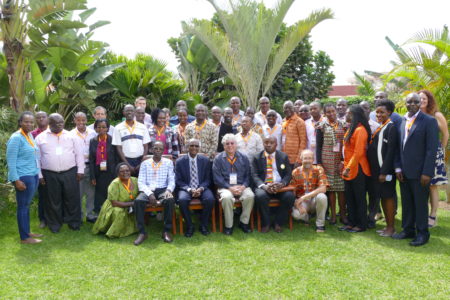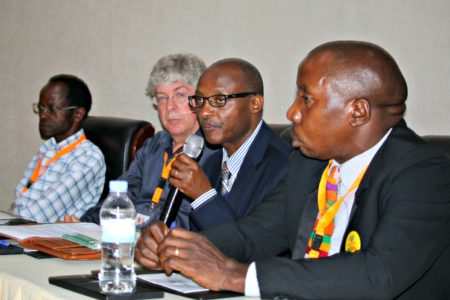
15 May 2017 – Kigali: The 16th Sweetpotato SpeedBreeders and Genomics Community of Practice (CoP) meeting has opened in Grand Legacy Hotel in Rwanda’s capital Kigali. The theme of the meeting is “Integrating modern genomics tools with traditional approaches.”
The meeting was officially opened by the Director General of the Rwanda Agriculture Board (RAB), Dr. Mark Cyubahiro Bagabe. In his opening address, Dr. Bagabe lauded the efforts that various governmental and non-governmental partners have made to promote sweetpotato in Rwanda. He stated that in the past, cereal crops had always taken center stage. However, recent challenges such as climate change, pests and diseases had made it necessary to consider alternative food crops even more. “Recently we had the problem of army worms. Sweetpotato suddenly came into focus as the alternative. Right now, planting of sweetpotatoes has expanded and Rwanda could soon become an exporter of sweetpotato, “he said.

This growth of sweetpotato production in Rwanda has largely been driven by the supportive policies adopted by the Government of Rwanda. “Many countries in sub-Saharan Africa depend on agriculture. While donors and governments talk a lot about investing in agriculture, Rwanda has translated this talk into actual investment in sweetpotato production,” Dr. Robert Mwanga, co-leader of the SpeedBreeders and Genomics CoP and one of the 2016 World Food Prize laureates says.
Dr. Craig Yencho, the other co-leader of the CoP, is the head of the Genomic Tools for Sweetpotato Project, hosted at the North Carolina State University. He states that teamwork has also been critical to the progressive development of sweetpotato breeding in sub-Saharan Africa. Today, this progress can be seen in twelve countries that have crossing blocks and are releasing varieties. He also pointed to the growing recognition of sweetpotato as a food and nutrition security crop in 2016. That led to three CIP sweetpotato scientists, Drs. Jan Low, Robert Mwanga and Maria Andrade, along with Dr. Howarth Bouis (HarvestPlus) receiving the World Food Prize for their work on biofortification.
Over the next four days, participants from 16 countries will have practical sessions on how to integrate genomic tools into their sweetpotato breeding work. Traditionally, sweetpotato breeding programs have taken a long time, 7 to 8 years, to produce a new variety. These tools aim to make sweetpotato breeding more efficient, by enabling breeders to develop sweetpotato varieties that are adapted to the specific growth conditions, and which meet the preferences of consumers, in a shorter time.
Moreover, as of 2005, most countries in Africa had no real breeding program and relied on testing materials developed elsewhere. Now, there are 12 countries with active breeding programs in sub-Saharan Africa (SSA) and three more engaged in varietal selection. The challenge now is to have sustained support for these breeding programs, and deal with increasing demands to meet diverse needs of different user groups.
The meeting will also feature a visit to Rubona Research Station, to learn about the station’s varieties’ development, crossing block and germplasm maintenance, tissue culture laboratory and pre-basic seed production. These operations feed into the sweetpotato seed system, and help to ensure that farmers in Rwanda can get supplies of disease-free vines during the planting season.
